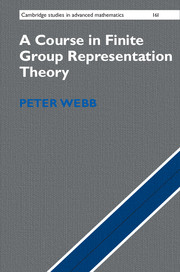Book contents
- Frontmatter
- Contents
- Preface
- 1 Representations, Maschke's Theorem, and Semisimplicity
- 2 The Structure of Algebras for Which Every Module Is Semisimple 15
- 3 Characters
- 4 The Construction of Modules and Characters
- 5 More on Induction and Restriction: Theorems of Mackey and Clifford
- 6 Representations of p-Groups in Characteristic p and the Radical
- 7 Projective Modules for Finite-Dimensional Algebras
- 8 Projective Modules for Group Algebras
- 9 Changing the Ground Ring: Splitting Fields and the Decomposition Map
- 10 Brauer Characters
- 11 Indecomposable Modules
- 12 Blocks
- Appendix A Discrete Valuation Rings
- Appendix B Character Tables
- Bibliography
- Index
12 - Blocks
Published online by Cambridge University Press: 05 August 2016
- Frontmatter
- Contents
- Preface
- 1 Representations, Maschke's Theorem, and Semisimplicity
- 2 The Structure of Algebras for Which Every Module Is Semisimple 15
- 3 Characters
- 4 The Construction of Modules and Characters
- 5 More on Induction and Restriction: Theorems of Mackey and Clifford
- 6 Representations of p-Groups in Characteristic p and the Radical
- 7 Projective Modules for Finite-Dimensional Algebras
- 8 Projective Modules for Group Algebras
- 9 Changing the Ground Ring: Splitting Fields and the Decomposition Map
- 10 Brauer Characters
- 11 Indecomposable Modules
- 12 Blocks
- Appendix A Discrete Valuation Rings
- Appendix B Character Tables
- Bibliography
- Index
Summary
Block theory is one of the deepest parts of the representation theory of finite groups. In this chapter we can only scratch the surface of the sophisticated constructions and techniques that have been developed. Our goal is to serve the needs of the nonspecialist who might attend a talk on this topic and wish to understand something. For such purposes it is useful to know the basic definitions, to have an idea of the defect group of a block and its relation to vertices of indecomposable modules in the block, and to have seen the different methods used in block theory—sometimes ring theoretic, sometimes module theoretic.We will describe these things, and at that stage we will be able to see that the blocks of defect zero introduced in Chapter 9 do indeed deserve the name. We will demonstrate the equivalence of several different definitions of the defect group of a block, given in terms of the theory of vertices, the relative trace map, and the Brauer morphism. We will conclude with a discussion of the Brauer correspondent and Brauer's First Main Theorem, which establishes a correspondence between blocks with a certain defect group D and blocks of NG(D) with defect group D.
One of the confusing things about blocks of finite groups is that there often seems to be more than one definition of the same concept. Different authors use different approaches, and then may havemore than one definition inmind at the same time. The common ground is a finite group G and a splitting p-modular system (F, R, k), where R is a discrete valuation ring with field of fractions F of characteristic zero, and with residue field k of characteristic p. Whatever a p-block of G is, it determines and is determined by any of the following data:
• an equivalence class of kG-modules, sometimes simple, sometimes indecomposable, sometimes arbitrary,
• an equivalence class of RG-modules,
• a primitive central idempotent in kG, or in RG,
• an equivalence class of primitive idempotents in kG, or in RG,
• an equivalence class of FG-modules,
• an indecomposable 2-sided direct summand of kG,
• an indecomposable 2-sided direct summand of RG,
• a division of the Cartan matrix of kG into block diagonal form.
- Type
- Chapter
- Information
- A Course in Finite Group Representation Theory , pp. 257 - 290Publisher: Cambridge University PressPrint publication year: 2016



